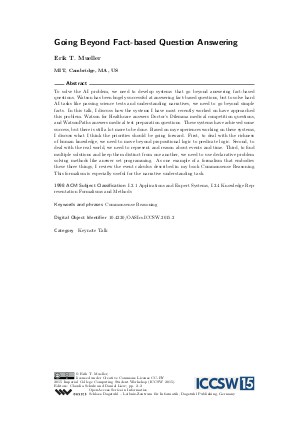Going Beyond Fact-based Question Answering (Keynote Talk)
Author Erik T. Mueller
-
Part of:
Volume:
2015 Imperial College Computing Student Workshop (ICCSW 2015)
Part of: Series: Open Access Series in Informatics (OASIcs) - License:
 Creative Commons Attribution 3.0 Unported license
Creative Commons Attribution 3.0 Unported license
- Publication Date: 2015-09-23
File

PDF
OASIcs.ICCSW.2015.2.pdf
- Filesize: 184 kB
- 1 pages
Document Identifiers
Subject Classification
Keywords
- Commonsense Reasoning
Metrics
- Access Statistics
-
Total Accesses (updated on a weekly basis)
0Document
0Metadata
Abstract
To solve the AI problem, we need to develop systems that go beyond answering fact-based questions. Watson has been hugely successful at answering fact-based questions, but to solve hard AI tasks like passing science tests and understanding narratives, we need to go beyond simple facts. In this talk, I discuss how the systems I have most recently worked on have approached this problem. Watson for Healthcare answers Doctor’s Dilemma medical competition questions, and WatsonPaths answers medical test preparation questions. These systems have achieved some success, but there is still a lot more to be done. Based on my experiences working on these systems, I discuss what I think the priorities should be going forward. First, to deal with the richness of human knowledge, we need to move beyond propositional logic to predicate logic. Second, to deal with the real world, we need to represent and reason about events and time. Third, to find multiple solutions and keep them distinct from one another, we need to use declarative problem solving methods like answer set programming. As one example of a formalism that embodies these three things, I review the event calculus described in my book Commonsense Reasoning. This formalism is especially useful for the narrative understanding task.
Cite As Get BibTex
Erik T. Mueller. Going Beyond Fact-based Question Answering (Keynote Talk). In 2015 Imperial College Computing Student Workshop (ICCSW 2015). Open Access Series in Informatics (OASIcs), Volume 49, p. 2, Schloss Dagstuhl – Leibniz-Zentrum für Informatik (2015)
https://doi.org/10.4230/OASIcs.ICCSW.2015.2
BibTex
@InProceedings{mueller:OASIcs.ICCSW.2015.2,
author = {Mueller, Erik T.},
title = {{Going Beyond Fact-based Question Answering}},
booktitle = {2015 Imperial College Computing Student Workshop (ICCSW 2015)},
pages = {2--2},
series = {Open Access Series in Informatics (OASIcs)},
ISBN = {978-3-95977-000-2},
ISSN = {2190-6807},
year = {2015},
volume = {49},
editor = {Schulz, Claudia and Liew, Daniel},
publisher = {Schloss Dagstuhl -- Leibniz-Zentrum f{\"u}r Informatik},
address = {Dagstuhl, Germany},
URL = {https://drops.dagstuhl.de/entities/document/10.4230/OASIcs.ICCSW.2015.2},
URN = {urn:nbn:de:0030-drops-54749},
doi = {10.4230/OASIcs.ICCSW.2015.2},
annote = {Keywords: Commonsense Reasoning}
}
